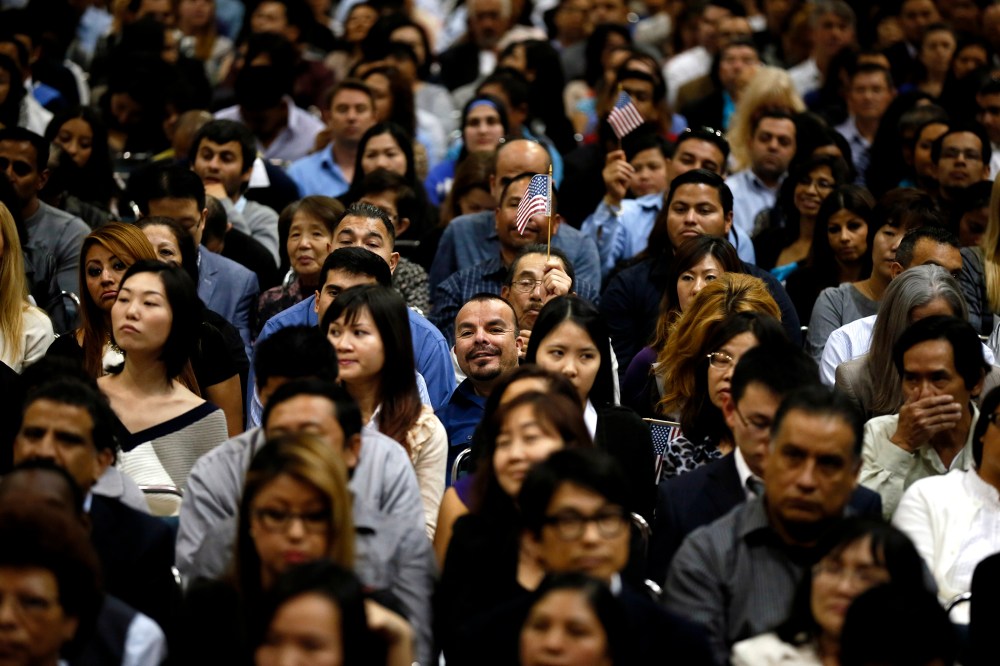After a year of dithering, House Republican leaders are close to unveiling a barebones set of principles that they say will guide them in crafting a series of immigration bills. The proposal could make its public debut as early as this week, according to The New York Times, when House Republicans meet in Maryland for their annual retreat.
While details are still closely guarded, activists expect the principles to include a plan to grant legal status to undocumented immigrants, a breakthrough for a caucus where “self-deportation” has long been the default position. Will it be able to thread the needle between reformers and border hawks? Here are five things you should keep an eye on once it drops to find out.
Is there a path to citizenship?
Under the Senate’s bipartisan bill, most qualifying undocumented immigrants who pass a background check would be able to apply for citizenship after a minimum wait of 13 years. The House plan is expected to be less generous. Rep. Bob Goodlatte, the chair of the Judiciary Committee and the GOP’s point man on reform, has been floating a compromise for months that would grant legal status to undocumented immigrants but only let them apply for citizenship through existing channels, which can be backlogged for decades.
Based on numerous reports, it’s likely some version of Goodlatte’s idea will be in the House principles and it’s a given that Republican leaders will tout the absence of a “special path to citizenship” as a sop to conservative skeptics. You should ignore this talking point and wait to see the details. That’s because “no special path to citizenship” doesn’t mean “no new citizens.”
Under current law, undocumented immigrants are barred from applying for a green card unless they first leave the country for three or 10 years – even if their spouse and children are American-born citizens. It’s a huge obstacle to citizenship and if House Republicans waive the bans, the nonpartisan National Foundation for American Policy estimates that 4.4-6.5 million of the estimated 11.7 million unauthorized immigrants in America today might eventually qualify for citizenship. That’s less than the Senate’s plan, which the Congressional Budget Office estimated would add 8 million new citizens, but far from insignificant. Republican leaders have also suggested they might treat DREAMers separately and give them their own path to citizenship.
On the flipside, some Republicans like former Florida Gov. Jeb Bush have suggested plans that would explicitly block legalized immigrants from becoming citizens. That would likely be a nonstarter with Democrats and immigration advocates.
How hard is it to get legal?
Citizenship aside, the question of whether to grant even limited legal status to undocumented immigrants is a painful one for House Republicans. House leaders will undoubtedly come under heavy fire from conservatives and tea party groups for even bringing it up.
Immigration advocates are worried that Republicans might try to make the legalization process too difficult in order to reassure their critics on the right. In particular, they’re concerned about suggestions that there may be “triggers” that have to be met before immigrants can apply for legal status like new security measures or benchmarks for success. Or they might prevent immigrants from applying if they have minor misdemeanors – some lawyers are worried being arrested for civil disobedience at an immigration reform rally might qualify.
As Simon Rosenberg, founder of the New Democrat Network, put it to reporters, activists want legalization to be “universal, immediate, and untriggered” as a starting point for negotiations.
Will the House turn America into Arizona?
To win over conservatives, the Senate bill added billions of dollars in new security measures at the last minute, including funding to double the size of the border patrol. Its sponsors backed the changes even as they grumbled the new measures would be expensive, inefficient, and unnecessary.
As it turns out, the House Republicans who were supposed to be won over by the move mostly felt the same way and were unimpressed. Instead, their focus is on better tracking unauthorized immigrants within the country rather than stopping them at the border, where security has improved significantly in recent years.
Here’s where they run into problems. Republicans on the House Judiciary Committee are considering a bill, the SAFE Act, that would encourage states to organize their own crackdown on illegal immigration. So far, states like Arizona and Alabama that have tried to turn local police into immigration enforcers have been stymied by a combination of public backlash and judicial rulings. The SAFE Act would put them on sounder legal footing, setting the stage for a potential flood of draconian state laws in Republican-controlled states.











